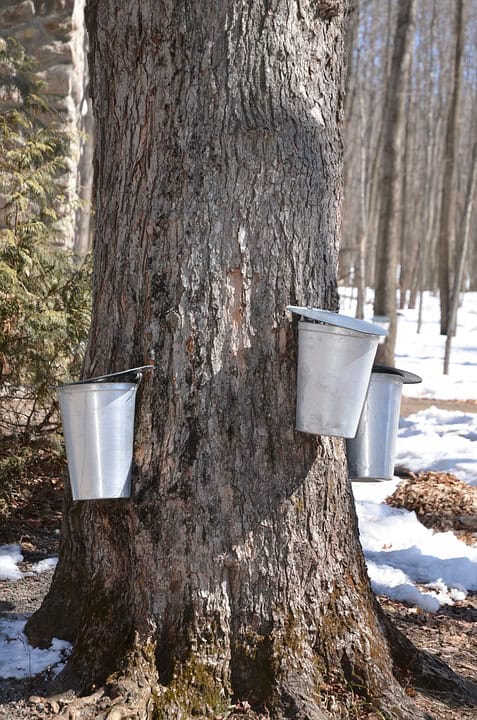by Alison Mitchell, Co-Executive Director, New Jersey Conservation Foundation
New Jersey isn’t nearly as famous as Vermont for maple syrup, though native sugar maple trees grow in our state’s north and central counties and many small farms tap trees for syrup.
South Jersey? Not so much. Sugar maples are extremely rare in the region, and those few that do grow were probably planted by homeowners.
But a new maple syrup industry is emerging in South Jersey, thanks to a Stockton University research project to determine if red maple (Acer rubrum) trees – a less-sugary species – can produce enough syrup to be sold commercially.
In 2020, Stockton University received two U.S. Department of Agriculture (USDA) grants totaling over $900,000 to gauge the viability of making syrup from the sap of red maples, which are plentiful in the forested swamps of South Jersey.
Red maple sap has only half the sweetness of sugar maple sap, so it takes twice as much to produce a gallon of syrup.
“The rule of thumb for red maples is it takes about 50 to 60 gallons of sap to make a gallon of syrup,” explains Judy Vogel, a professor at Stockton University and leader of the Maple Project.
Stockton is now in its third season of using advanced syrup-making technology – yes, there is such a thing – to produce America’s favorite pancake topping.
The USDA grant paid for technologies such as vacuum assist pumps and a reverse osmosis system at a red maple forest on Stockton’s 1,600-acre campus in Galloway Township, Atlantic County.
An extensive tubing system connects 400 tapped trees at Stockton to a central sap collection point. Vacuum assist pumps pull sap from trees more efficiently than old fashioned gravity. A reverse osmosis system removes water from the sap to help concentrate its sugars. Finally, the sap goes into a high-efficiency boiler, or evaporator, to produce the finished syrup.
Last year, Stockton’s red maple trees produced 25 gallons of maple syrup, and Vogel is hoping for twice that amount this year, assuming the weather cooperates. As with sugar maples, the sap flows best when temperatures dip below freezing at night and warm up during the day.
“We’ve shown that, yes, we can produce syrup from red maples in an industry-like environment,” Vogel said. “It’s the perfect marriage of technology and sustainability.”
While South Jersey will never produce maple syrup at Vermont’s scale, it appears feasible for small producers to make enough to sell at local shops and farmers markets.
“We’re looking to mimic in our state what happened with local honey,” Vogel said.
Trees are not harmed by the tapping, which is stopped once leaves start to grow in the spring. There’s no incentive to try to extend the season, said Vogel, because sap develops a bitter aftertaste once maple trees begin to bud.
As part of the grants, Stockton University is reaching out to South Jersey residents to engage anyone interested in learning to make syrup from red maples.
Residents with access to red maple trees who want to try syrup production are eligible to receive free taps and tubes for collecting sap. Even those without trees can “borrow” a few on a section of the Stockton campus.
The university has also set up several “community hubs” where would-be syrup makers can share small evaporators, also supplied by the university.
Right now, community hubs have been established at the Pinelands Preservation Alliance’s Rancocas Creek Farm in Southampton, the Appel Farm Arts and Music Center in Elmer, Marshallville Farms in Tuckahoe, the Deeply Rooted Learning Center in Cape May, Operation Safe Haven in Franklinville, and at a property in Egg Harbor City.
The Maple Project has additional evaporators to give away, and is actively seeking people or organizations to run community syrup production hubs.
“I’m looking for areas of New Jersey where there aren’t indigenous sugar maples,” Vogel said. “All of South Jersey is up for grabs.”
In case you’re wondering, Vogel reports that South Jersey red maple syrup is delicious.
“In general, people really love our syrups,” she said. “We’re in this very homespun phase of production right now. It’s the age-old ‘made with love’ that really does impact the flavors.”
Interested in having Stockton University teach you how to make red maple syrup, either as a cottage industry or for your own family? Find out more at the school’s Maple Project website at https://stockton.edu/maple/project.html or email the team at [email protected].
And for information about preserving New Jersey’s land and natural resources, visit the New Jersey Conservation Foundation website at www.njconservation.org or contact me at [email protected].

